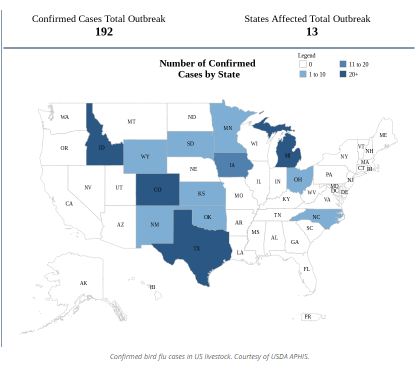By Ryan Hanrahan
Reuters’ Leah Douglas and Tom Polansek reported Thursday that “the U.S. bird-flu outbreak in dairy cattle is much larger than official figures suggest due to farmers’ reluctance to test their animals and risk the economic consequences of a positive result, according to Reuters interviews with dairy experts, veterinarians, and farmers in six states with known cases.”
“The U.S. Department of Agriculture has counted bird flu in about 190 dairy herds in 13 states since March. The virus’s jump from birds to cows heightened concerns that it could adapt to spread among humans,” Douglas and Polansek reported. “Scientists have warned that limited surveillance could weaken the U.S.’ ability to respond to further human spread. Thirteen dairy and poultry farm workers have been infected with bird flu this year, according to the Centers for Disease Control and Prevention.”

“State animal and human health experts in three states who work closely with veterinarians and farmers said the government tally is likely an undercount because farmers are fearful of the economic hardship brought by a positive test, including being restricted from selling their milk or cattle for weeks,” Douglas and Polansek reported. “‘While we have nine official positives, there are many, many, many more farms that are impacted or infected that are just not testing,’ said Joe Armstrong, a veterinarian and cattle expert at the University of Minnesota, who has spoken with farmers across the state.”
“A more accurate cattle case count for Minnesota would be three to five times higher, Armstrong said,” according to Douglas and Polansek’s reporting.
“Six farmers, veterinarians, and other experts said farmers were reluctant to test because they did not believe the virus is a serious concern, or because government incentives to test did not offset their expected losses,” Douglas and Polansek reported. “Colorado farmer Terry Dye, 78, said his two dairies were infected this summer and he did not notify the state because he wanted to handle it privately. State agriculture officials eventually heard about the infections and quarantined his animals, he said.”
“Phil Durst, an educator with Michigan State University who has spoken with farmers whose herds contracted the virus, said Michigan’s 27 positive herds are likely an undercount by at least a third,” Douglas and Polansek reported. “Jenna Guthmiller, an assistant professor of immunology at the University of Colorado who has studied the virus, said Colorado’s 63 positive herds are also likely an undercount.”
Inactive Bird Flu Virus Found in 17% of US Dairy Supply
Bloomberg’s Sophia Vahanvaty reported that “one-in-six dairy products in US retail stores contained signs of inactive bird flu virus this summer, regulators said, slightly lower than the numbers seen in a different survey when the pathogen was first found in the nation’s dairy herds.”
“None of the 167 samples, which included milk, ice cream, hard cheese, butter, cream cheese and aged raw milk cheese, contained viable H5N1 bird flu virus, the US Food and Drug Administration said. The results show pasteurized dairy remains safe to consume,” Vahanvaty reported. “It was the second FDA survey, after the first in April found inactive viral particles in one fifth of sampled dairy products. The latest effort tested a wider array of foods from more states, leading the FDA to caution that the results may not be directly comparable.”
USDA to Expand Beef Testing
Reuters’ Douglas reported earlier in the week that “the U.S. Department of Agriculture said on Tuesday it will expand bird-flu testing of beef entering the food supply as part of its response to the ongoing outbreak among dairy cattle, adding that U.S. beef and dairy products remain safe to consume.”
“USDA officials, in a call with reporters along with staff from other U.S. health agencies, said the tests will begin in mid-September and urged livestock workers to remain vigilant,” Douglas reported. “…The expanded testing will continue for the rest of the year, and will focus on beef from dairy cows, said Emilio Esteban, USDA’s under secretary for food safety.”
Source : illinois.edu